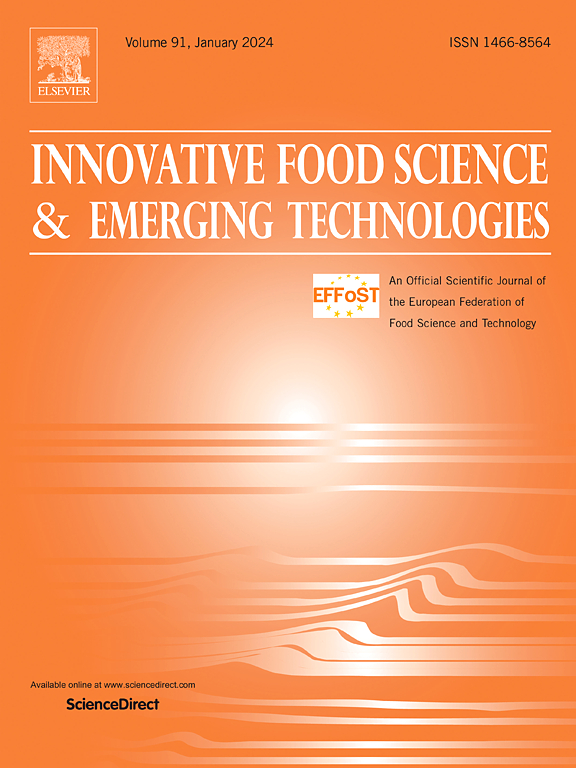Insight into the mechanism on nano fish bone improving the quality of marinated snakehead fish slices during freeze-thaw cycles
IF 6.3
1区 农林科学
Q1 FOOD SCIENCE & TECHNOLOGY
Innovative Food Science & Emerging Technologies
Pub Date : 2024-09-15
DOI:10.1016/j.ifset.2024.103821
引用次数: 0
Abstract
The effects of marinating with nano fish bone (NFB) on the physicochemical characteristics and quality of snakehead fish slices during freeze-thaw cycles (1, 3, 5, 7, and 9) were investigated. The highest alterations in surface hydrophobicity, carbonyl content and secondary structure of the slice myofibrillar protein, integrity of cellular structure, and slice quality (whiteness, thawing loss, cooking loss, and sensory) were found in the sample without cryoprotectant (Ck), followed by the sample with commercial cryoprotectant of polyphosphates (PPS), and the lowest in the NFB sample. Comparatively, more moisture but less free water was observed in the NFB sample during the freeze-thaw cycles. Furthermore, NFB surrounded the oil droplet to form a Pickering emulsion, resulting in the stabilization of oil in the marinade. The results indicated that NFB can serve as a potential alternative to commercial cryoprotectant in frozen fish slices, which is attributed to its antifreeze and antioxidant functionalities.
纳米鱼骨在冻融循环中改善腌制乌鳢鱼片质量的机理探究
研究了在冻融循环(1、3、5、7 和 9)期间用纳米鱼骨(NFB)腌制对乌鳢鱼片的理化特性和质量的影响。结果发现,不含冷冻保护剂(Ck)的样品在表面疏水性、羰基含量和切片肌纤维蛋白二级结构、细胞结构完整性以及切片质量(白度、解冻损失、烹饪损失和感官)方面的变化最大,其次是含聚磷酸盐(PPS)商业冷冻保护剂的样品,而 NFB 样品的变化最小。相对而言,在冻融循环过程中,NFB 样品中的水分较多,但游离水较少。此外,NFB 包围着油滴,形成皮克林乳状液,从而稳定了腌泡汁中的油。研究结果表明,NFB 可作为冷冻鱼片中商业冷冻保护剂的潜在替代品,这归功于它的防冻和抗氧化功能。
本文章由计算机程序翻译,如有差异,请以英文原文为准。
求助全文
约1分钟内获得全文
求助全文
来源期刊
CiteScore
12.00
自引率
6.10%
发文量
259
审稿时长
25 days
期刊介绍:
Innovative Food Science and Emerging Technologies (IFSET) aims to provide the highest quality original contributions and few, mainly upon invitation, reviews on and highly innovative developments in food science and emerging food process technologies. The significance of the results either for the science community or for industrial R&D groups must be specified. Papers submitted must be of highest scientific quality and only those advancing current scientific knowledge and understanding or with technical relevance will be considered.

 求助内容:
求助内容: 应助结果提醒方式:
应助结果提醒方式:


